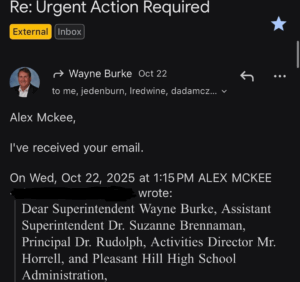A Missouri high school student reports a debilitating “persistent pattern of harassment” and hostility toward him – including a cryptic late-night email from a teacher – that has yet to subside since he began forming a Turning Point USA chapter at his school a year ago.
Alex Mckee, a junior at Pleasant Hill High School southeast of Kansas City, reports being ordered to take down posters for the TPUSA “Club America” chapter and being repeatedly harangued by one teacher in what he describes as “attempts to ‘brainwash’ me with liberal ideology.”
When his posters quoted the Constitution, he says, one school official called it politically dangerous.
In a comprehensive, nearly 16,000-word email to district officials Wednesday shared with The Heartlander, Mckee argues even his mother has been met with hostile glares by district officials at a football game – and that he was angrily confronted in a school hallway as recently as last Tuesday by a football player coached by the teacher in question.
“I’ve received your email,” was the only reply to Mckee from the district superintendent as of midafternoon Monday, except for a request to clarify the young man’s request to see video surveillance from the school.

Mckee also copied The Heartlander on a late-night email from the teacher in October 2024 reading simply, “I hope you’re paying attention.”
Though the young man found the email cryptic and ominous, he responded to the teacher the next morning, “What do you think I should be paying attention to?”
The teacher responded:
- Special Counsel Jack Smith unsealed immunity filing
- Timing of the longshoremen’s strike
- Timing of the escalation of Israel / middle east conflict
The young man says the long-running saga and the district’s failure to hold the teacher accountable have caused continuing emotional distress and crippled his coursework, which includes dual enrollment classes at the University of Central Missouri.
His mother held him out of school on Thursday, he informed the district in his email, as “a responsible, appropriate, and legally protected exercise of parental judgment and a necessary step to prevent further deterioration of my mental health.”
Mckee cites another email, sent by his mother at 2:35 a.m. Oct. 13, as evidence of the toll it has taken on his family.
“Parents should not have to stay awake in the middle of the night drafting formal legal complaints to school administrators to protect their children from staff misconduct,” Mckee informs district officials, “and the fact that my mother felt compelled to do so reflects the severity of the situation and the desperation we were feeling.”
Pleasant Hill officials have not responded to multiple requests from The Heartlander for comment on the situation.
Mckee says Superintendent Wayne Burke “confirmed in explicit, unequivocal, and unambiguous terms” that he told the teacher “not to speak to me.” But just 48 hours later, Mckee says, the teacher passed him in the hall and “looked directly at me, making sustained and deliberate eye contact. His look was unmistakably hostile, aggressive, and intended to intimidate me. … it was a purposeful, prolonged, and menacing stare. …
“I could hear him muttering something under his breath as he walked past me.”
The student told The Heartlander he felt the teacher’s glare again on Tuesday.
The teacher, Mckee writes, had previously “repeatedly engaged me in one-on-one conversations, both in the classroom and in other settings, during which he would present political viewpoints, ideological arguments, and partisan commentary in a manner that I felt was explicitly designed to influence and shape my political beliefs and to align me with his own liberal ideology.”
The incidents, the young man writes in his lawyerly email to the district, “span more than one year and demonstrate a sustained, deliberate, and egregious pattern of inappropriate conduct by [the teacher], including political indoctrination of a minor student, boundary violations that suggest predatory attention, intimidation and implicit threats, apparent retaliation for protected speech and advocacy, and ongoing breaches of confidentiality that have exposed me to public harassment and humiliation.”
He further writes to district officials:
The constant stress of wondering whether I would encounter [the teacher] in the hallway, the humiliation of being publicly confronted by other students who had clearly been told about my complaints, the frustration of submitting detailed incident reports that were acknowledged but never acted upon, and the overwhelming sense of helplessness and isolation that comes from being failed by the very adults who are supposed to protect and support students all combined to create a mental and emotional state in which academic achievement became secondary to basic psychological survival.
As for the teacher’s cryptic “paying attention” email, sent just before 9 p.m., Mckee writes, “The timing of the message was deeply unsettling, as it suggested that Mr. Amos was thinking about me personally and reaching out to me individually at a time when such communication was neither appropriate nor necessary.”

